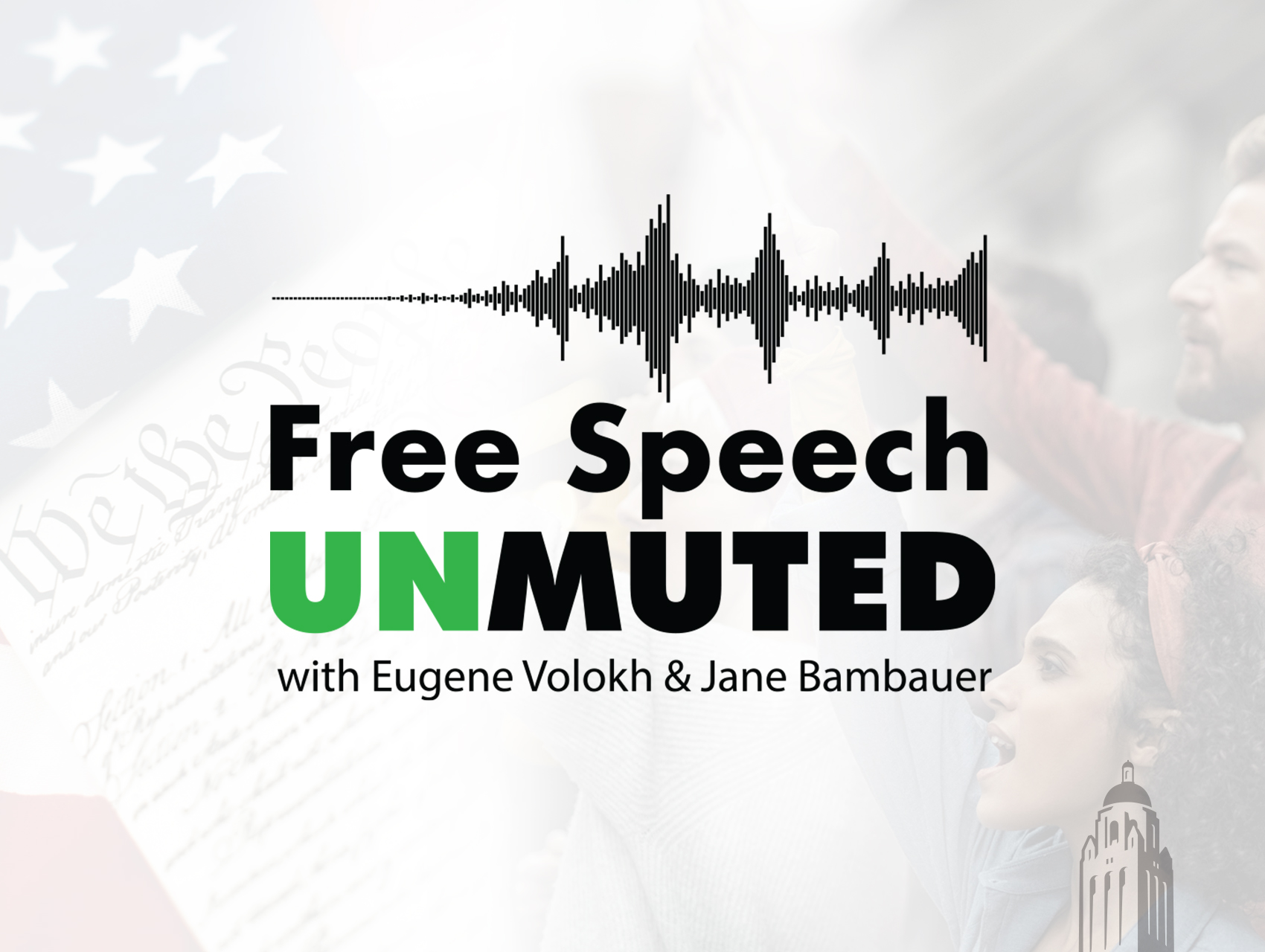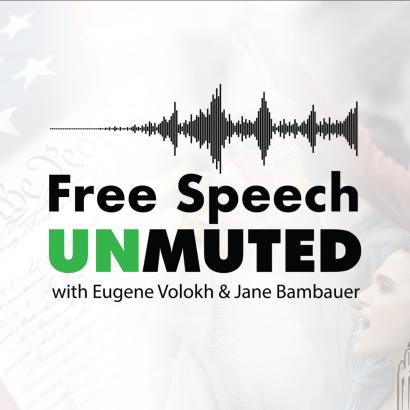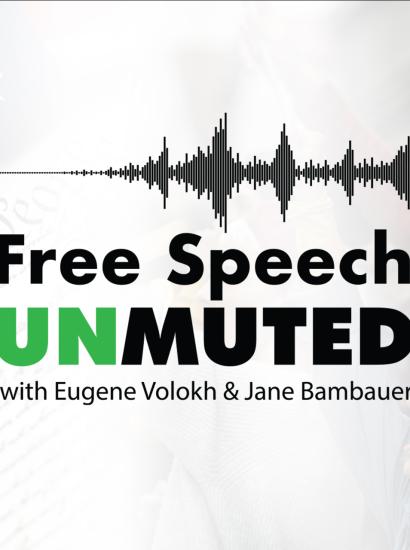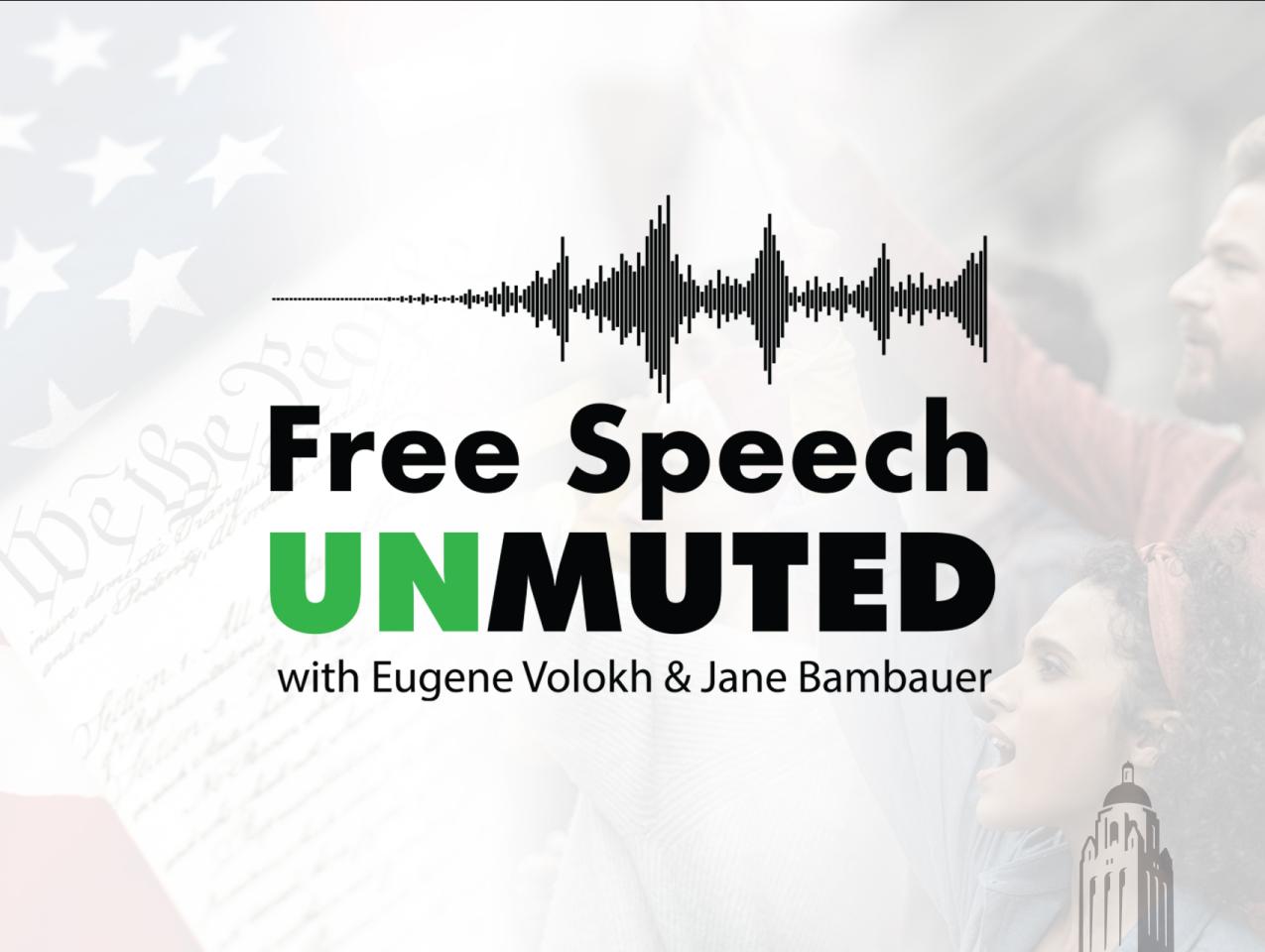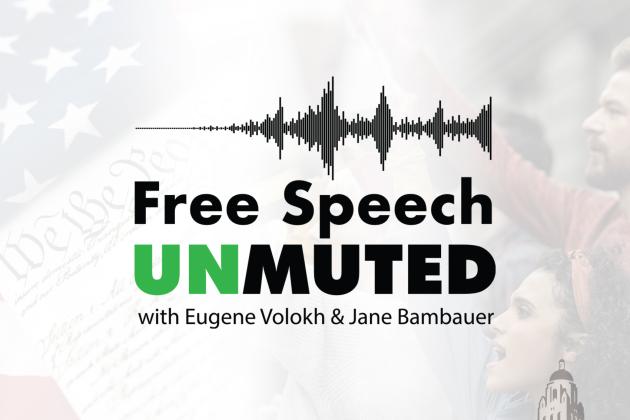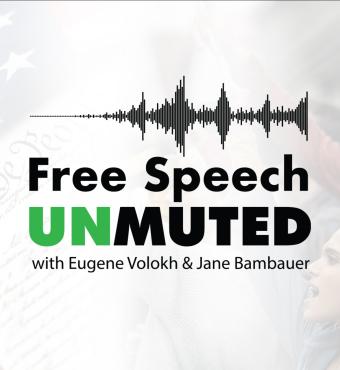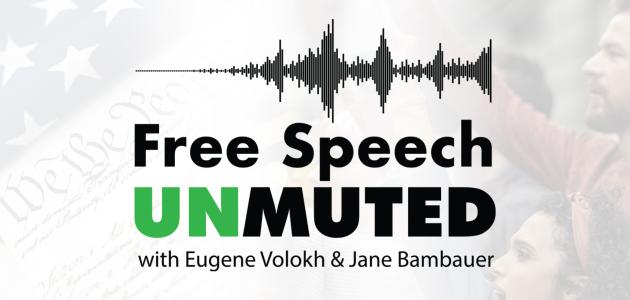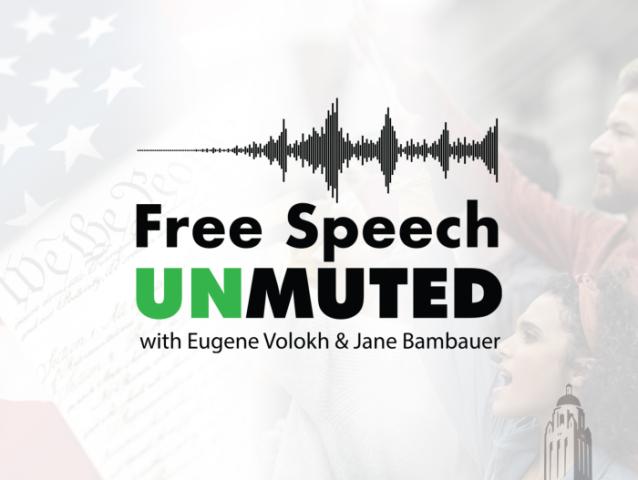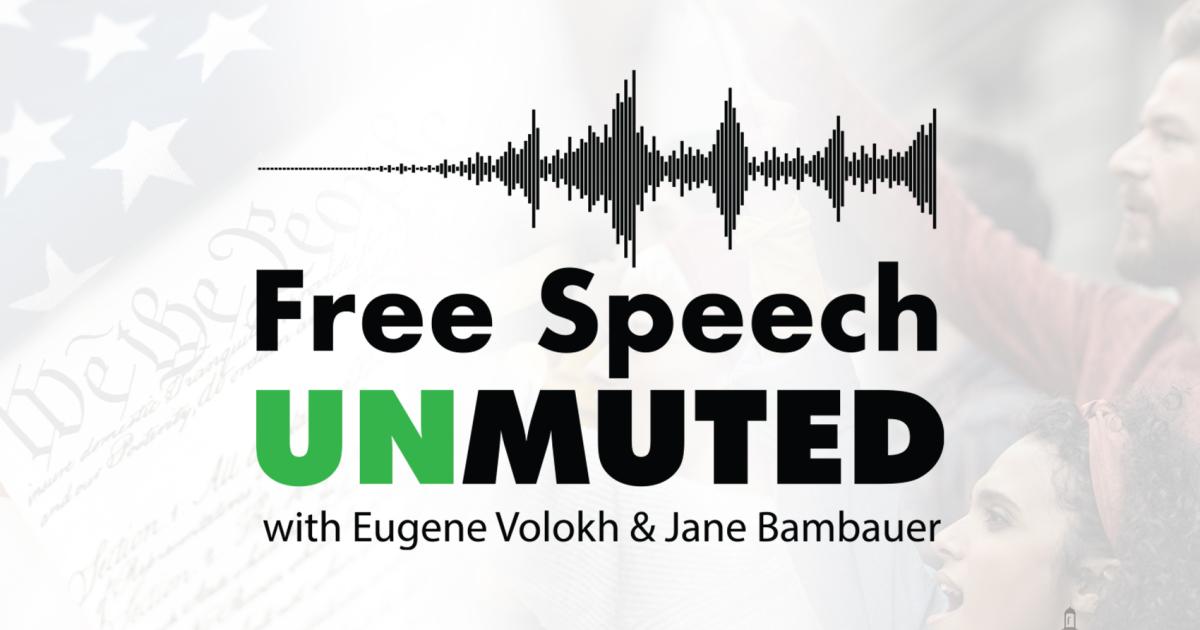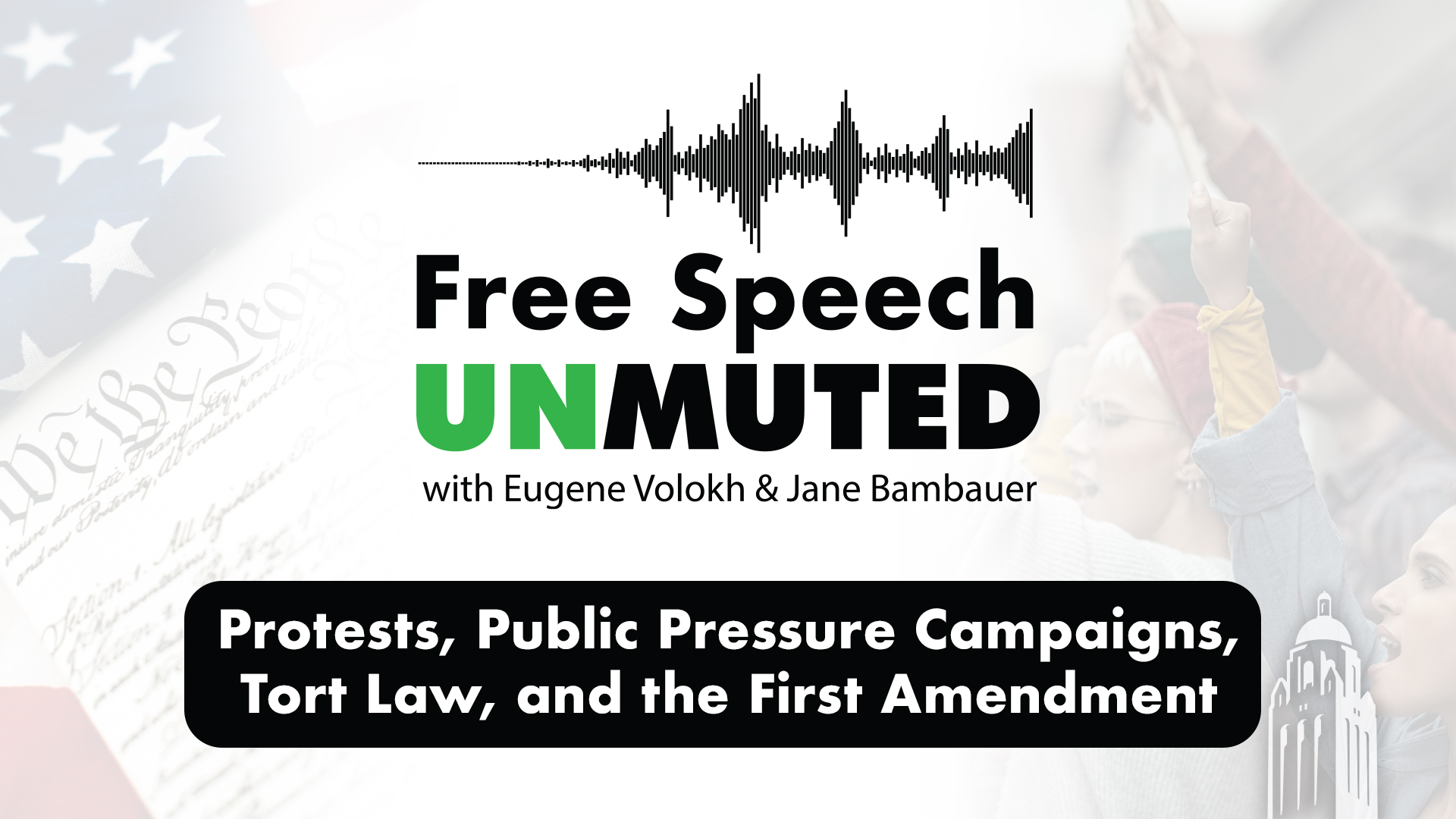- Law & Policy
- Revitalizing American Institutions
Can you sue protesters who block the street in front of your business? Protesters who block your way to work? People who are trying to get you fired?
Eugene Volokh and Jane Bambauer, who have written and taught about tort law as well as free speech law, discuss all these questions and more.
WATCH THE VIDEO
>> Eugene Volokh: Hello, welcome to Free Speech Unmuted. I'm one of your hosts, Eugene Volokh at the Hoover Institution, and my co-host is Jane Bambauer, who's a professor of law and professor in the communications school at the University of Florida. Now, we both specialize in First Amendment law in large measure, but in addition, we have also both written about and taught tort law, which is to say the law of civil liability for injurious conduct.
What actually tort exactly means and how it's defined is itself a complicated question. But basically, I think most people think torts, they recognize that this area of civil liability is important in policing people's behavior in various ways. And it turns out to intersect in very interesting ways with the First Amendment.
So this episode is about protest torts and political pressure torts. Now, those are not terms of art. They're something that we're trying to pioneer as terms of art in an article that we're co-writing. Protest torts are basically torts that stem from large in-person protests. The harms are usually unrelated to what the protest is saying.
They're things like blocking roads and the like. So the question is, when can somebody be sued for that? Then political pressure torts or torts stemming from political pressure campaigns, mostly online, although not necessarily. There's historical ones, even from before the Internet. And the harms usually stem from the content of the speech, trying to get people fired, harshly criticizing people in ways that might lead to physical attacks by some people in the audience.
Publishing identifying information about people in ways that might yield attacks or emotional distress, libeling people and the like. And just to give a sense of how broad, and we like to think important, this topic, is just think about the various kinds of campaigns, various kinds of political movements in which these things have come up.
For example, there have been lawsuits against anti-abortion groups over things like blocking of clinics or over posting information about abortion providers. There have been lawsuits against white supremacist groups. There have been lawsuits, especially in the 60s, but going on in the 70s, against anti-communist groups alleging, for example, that they libeled people by accusing them of communism.
There have been lawsuits against people claiming a fraud in the 2020 election, mostly libel lawsuits. So you might say, that sounds like lawsuits against conservatives or right wingers, loosely speaking. But of course, there have been lawsuits, civil rights groups as well for various boycotts they organize or things that might expose people to possible retaliation because of what they reveal about people.
There have been lawsuits against environmental groups. There have been lawsuits against labor unions for quite a long time, because a lot of what labor unions do is try to interfere with the employer's business as a form of pressure. Much of that is lawful, some of it may not be.
There have been lawsuits against Black Lives Matter and related movements. Potentially, there are lawsuits against pro-Palestinian protesters, either again, based on their, for example, physically blocking certain places or based on things that they might say. So these are really important questions. Now, I should stress we're writing this article.
We haven't written the article yet.
>> Jane Bambauer: We have a pretty good sense of what the law is, but it's kind of tentative.
>> Eugene Volokh: And I think, at times, we'll mention that our sense is tentative in part, because tort law is state law. So the rules may be quite different in different states.
Now, they may be in the shadow of the First Amendment, which provides some degree of protection for speakers in general, but as we'll see, it's not necessarily complete protection. So the rules may differ from jurisdiction to jurisdiction. Also, it's judge made law and sometimes there just aren't a lot of precedents on a particular question.
So I hope this will be interesting to people. And again, we're quite confident it's important as to a lot of different kinds of political movements, but this is something where we're going to be somewhat tentative.
>> Jane Bambauer: Yeah, and I think we're also trying to write this paper to contribute to tort law and theory as well.
So maybe I can explain a little bit why we think that articulating how tort law will apply to these types of protests and pressure campaigns is going to be valuable to society. So first of all, some of the behavior, especially if you think about protests that go awry or that have at least some members within it who engage in violence or physical property damage or whatnot.
Tort law often overlaps with criminal law, where the same conduct can lead to both criminal and civil liability. But it may very well be that the state, for a variety of reasons, doesn't wanna pursue otherwise good actions. Tort law allows individuals who have suffered some sort of harm to go ahead and bring file a case anyways, that's the civil system.
Tort law also extends beyond the bounds of criminal law. So they're not coterminous, they overlap, but each has some range that the other doesn't. And so, for example, libel and disclosure of private facts. Some of the things we'll be talking about in a little bit are strictly exclusively in the domain of tort and not in criminal law anyways.
By filing suit based on a tort law theory, claimants can ask for an injunctive remedy. And so this can be enforced even through criminal sanctions if necessary in order to make future behavior, current and future behavior of the putative defendants change. And then finally, you might think, well, tort law is somewhat limited, though.
If we think that the people who are most likely to be kind of disruptive and violent at a protest, for example, are also less likely to have assets, maybe tort law is not going to be that relevant. But we could see some forms of liability based on assisting the organizations that basically complicity liability, some organizations that fund or provide materials and support for protest movements.
If they have the right level of awareness and provide the right level of support, then they might face tort liability as well. And so this domain, it could extend well beyond just the individual who may be the most directly at fault.
>> Eugene Volokh: So, yeah, that's right. If I may just add one more thing, so a lot of times people think, you're gonna sue a protester.
They're just a bunch of college kids, or they're a bunch of maybe even older people who, this is what they do. They don't make a big living elsewhere, how are you gonna get any money out of them? So one possibility is to get money out of organizations that may fund them or support them.
But also, the fact is some protesters might have some money. Now, it's not a good business proposition if you're just thinking about it as a matter of the finances, say, of a law firm. My business is gonna be suing people who don't have a lot of money. It's not a great line of business.
But if the plaintiff. For ideological reasons, really wants to stick it to a defendant and let's assume the defendant really is culpable. The plaintiff might say, look, I'm going to spend money for legal fees, or perhaps more likely there'll be a law firm, public interest law firm, that is supported perhaps by contributors.
And we are going to make some of these people pay some, maybe not a lot, but enough to make them hurt and enough to warn them that like blocking an abortion clinic or blocking a bridge or libeling people is a bad behavior. And that is something that they and others like them should be deterred from doing so.
>> Jane Bambauer: Yeah, and maybe I'd also add, there's some valor that comes with an arrest that you don't quite get when you are sued. So that may also be another.
>> Eugene Volokh: Nobody wears that as a badge of pride.
>> Jane Bambauer: No, they do not, right?
>> Eugene Volokh: So let me just close by mentioning briefly the First Amendment, which of course is very important.
We're not here to be cheerleaders for tort law, but we're here partly just to accurately describe what the legal rules are, but also talk about what might make sense. The First Amendment certainly limits civil liability as well as criminal liability. The Supreme Court made that clear in the libel context in New York Times vs Sullivan.
But throughout American history, it's been understood that freedom of expression, should be considered in deciding civil liability claims. But, while it may limit such liability, it doesn't completely preclude it. So, clearest example is content neutral liability theories based on physical harms, obstruction, and the like. So, for example, this has arisen most clearly and most often with regard to anti abortion protests.
Anti abortion protesters are free to protest in certain ways, like on a sidewalk. But once they block access to a building, as whether by trespassing or by standing in the sidewalk in a way that people can't access the building, that could be made a crime, and it certainly could be made a tort as well.
You're not entitled to violate these neutral rules of property law, like trespass law, let's say you're not entitled to trespass. You're not entitled to block entrances, even if you have ideological reasons. Content based liability is much more constrained by the First Amendment. But there are some exceptions to the First Amendment that may be in play.
One example is libel law. So within the constraints imposed on libel law, libel lawsuits are permissible. Likewise, true threats of illegal conduct, especially though not only violence, are constitutionally unprotected. So if the way that somebody tries to accomplish a political goal is by threatening people, not just threatening them with social ostracism, let's say, but threatening them with violence or threatening them with vandalism, that is unprotected.
Likewise, seems likely that solicitation of specific crimes or torts is also unprotected, we'll get to that. Get to that a little later. And finally, there are First Amendment limits on this complicity liability that you can't just sort of say, well, you're a donor to a group, so now you're responsible for everything that the group does.
Or you're associating with people, so now you're responsible for things that those people you associate with do. The Supreme Court has made clear that that kind of liability can unduly chill const institutionally protected association. At the same time, in some situations, especially if, for example, you purposefully donate money or resources so that other people commit a crime or tort.
Or maybe even if you know that's what they're doing and you're substantially assisting, the First Amendment may not be that much of a barrier. That itself is going to be an important part of our article and of our conversation here. So that's the general framework. Let's talk a little bit about some of the details again, realizing we can't get into all the details and they may vary sharply from state to state, may be uncertain in sub states.
So let's start, Jane, if I could ask you, tell us about the physical protests. Again, these are the kinds of things where the concern is usually about physical presence. Doesn't much matter what people are saying, but it may be where they are when they're saying it.
>> Jane Bambauer: Right.
Right or maybe how loudly they're saying it.
>> Eugene Volokh: That too, that too. How loudly they're saying it. Yeah, so I think the most common and obvious ones are the one are tort claims brought based on blocking of some business or establishment that relies on customers to have access to it.
So if it's pretty straightforward at this point. There are successful cases if a protest is intentionally blocking a passageway to a building. And then likewise the converse we've also seen even in case like cases like Snyder versus Phelps, that's the Supreme Court case involving the protest at the funeral.
The court was quick to emphasize that, it was the speech alone that was at issue or the content of the speech that was at issue because the protesters at the Westboro Baptist Church who were protesting these funerals made sure to stay, with a broad clearance from the actual site of the funeral.
So nuisance cases more or less work the same way. One thing that's interesting though, that.
>> Eugene Volokh: So just to make clear there's people talk about nuisance cases, which are cases that are filed by the plaintiff.
>> Jane Bambauer: Yes, okay.
>> Eugene Volokh: Claims of nuisance under the tort, which is called nuisance.
>> Jane Bambauer: Right, yes. Very good, very good. Yeah, so it's some other conduct that preceded the filing of the suit that was a nuisance. And so this actually some of the same behavior can fall under nuisance. So if you're blocking the way. So actually one case, for example, involving a Walmart was an obstruction in the roadway and it caused traffic therefore to avoid the roadway and use the private, the private driveway of a Walmart center.
And as a result, people who were actually trying to get to Walmart couldn't access Walmart. So that was an example of a successful nuisance claim. I think, Eugene, though you found that pretty consistently it's only the businesses themselves that can successfully, that can have successful suits along this theory and it's not the.
>> Eugene Volokh: Yeah, and that's particularly clear when there's a business being targeted, they could say the damage is really to us. And sometimes even if it's not being targeted, as you point out with a nuisance claim, the business can say, look, this interferes with my business. But of course, what a lot of people are upset by is the people like somebody's having a protest and it blocks traffic and the people in traffic are upset and each one may only have lost a certain, a certain amount of war of money.
But maybe you put together, have an aggregate, some sort of class action or aggregate lawsuit that they want to sue. So tell us about what if ever that's possible.
>> Jane Bambauer: Well, actually, maybe you should. I'm not sure. I mean, that's sort of the problem is that.
>> Eugene Volokh: Right.
>> Jane Bambauer: The aggregate cost of the individuals who are trying to travel and get to various places that are not otherwise affected by protest blockage. My understanding is that they would lack the claim because they're not.
>> Eugene Volokh: Right most of the time. So, yes, so here's my tentative thinking here.
And again, I should stress it's tentative. So, first one has to understand that as a general matter, the law treats very differently economic injury, pure economic injury from physical injury to people or property and the economic harm that stem from that. So if you injure me and as a result I lose income, I could sue you on the theory that you were negligent.
And certainly if you did it intentionally. Likewise, if you injure my property, physically damage my business, and as a result, it loses income, there could be liability. But if all you do is you interfere with my economic prospects, there isn't standard negligence liability. Classic example is, let's say I drive my car into some, I don't know, telephone pole or whatever.
As a result, the street is blocked. There's real damage because of my negligence. There's real damage to neighboring businesses in that people can't get there. But they generally can't sue me for negligent interference with economic relations. Likewise, if some people waste hours and hours in traffic as a result of the traffic jam, they can't sue me either.
So here's what I think might be relevant. So imagine that there is a protest and it means people are jammed in traffic and they have to turn to avoid the protest and they have extra hour in their commute and there are thousands of people like that and you get them all together.
I don't think they can sue. They can't sue for interference with business relations because the protest wasn't targeted at their business relations. They can't sue for nuisance generally. Because generally when everybody is harmed by the nuisance more or less equally, when thousands of people are, usually the law says that's left to the criminal justice process, let's say.
Or that's left to a lawsuit that is filed by maybe the city or some such or.
>> Jane Bambauer: Yeah, attorney general or something, yeah.
>> Eugene Volokh: But let's say that they block a freeway before an exit. So here I am, I'm sitting in traffic. My car is standing in traffic, and there's no way out.
There's no way to get out until their protest is over. Now, physically, I could get up and leave, but leaving your car, my car, in the middle of the roadway, that's a crime. So I'm not legally allowed to leave. I think that may very well be the torch of false imprisonment because it doesn't just make things inconvenient for me for some time.
For as long as the protest lasts. And it's especially true if it's, say, on a bridge, but also if it's just on a limited access highway before an exit. For as long as the protest lasts, I am, by a combination of the protest and my legal obligations, I am trapped.
And that is thought of as an interference, not just in my economic interests, with my dignitary right not to be forced to stay in a place I don't want to be. So that it's an interesting. You might say that's kind of a silly distinction, Wallach. If the protest is right before an exit, right after, maybe there's a subtle difference, but it's not what's really important, which is interference with people's lives from blocking of traffic.
But I do think this may be a line that the law, at least in some states will.
>> Jane Bambauer: Yeah, and I mean, there is some logic to it. I mean, for one, there's just a line drawing logic, which is a logic in itself. But also, if you can turn around and go another way, it's a del versus a forced sitting, where I, I think there's some, some natural understanding that, that it's a real autonomy loss.
Well, another example that has come up, I think, in our previous conversations together was the protest at Columbia when the students who took over the hall. I'm forgetting the name of the hall, maybe you know the name of it, but there was a janitorial staff that were still in the hall.
Do you, do you remember this? And so the janitorial staff were. Were left in the building that had been blockaded and we're stuck there for, I think it was six hours or so. So that's a good example, I think, of a protest-related false imprisonment claim not involving cars.
Okay, good.
>> Eugene Volokh: So let me just mention one more thing before we move on. Occasionally there are also claims of possible physical injury as a result of blockage of roads. So, for example, let's say somebody says, you blocked the road. I was sick, I mean, I was sick, I was injured in some other way.
And as a result, I couldn't get to the hospital quickly enough in the ambulance. So as a result, I was more gravely injured. Because your protest foreseeably, not purposefully, but foreseeably interfered with the ambulance traffic. That is, that is potentially a plausible theory, but again, it all depends on the facts.
In a typical protest, thankfully, that doesn't really happen. But if it does, then when there's physical injury, even stemming indirectly from people's behavior, so long as it's foreseeable. So long as it's not some freakish accident, but something that reasonable people would anticipate, there could indeed be liability for that physical injury.
>> Jane Bambauer: Well, in fact, I teach a case in my torch class where a train is very slowly creeping along at like five miles an hour through a city. And so an ambulance, this is an old case. So an ambulance had to go directly or a fire truck had to go directly over the tracks in order to get to its fire truck.
But every time it got to the next intersection, the train just barely made it in time. And it didn't stop. If it had stopped, it would have been fine, but it kept going at a horrible place. And so it was foreseeable that anyway. Okay, so, Eugene, why don't you talk about political pressure campaigns and what type of tort liability can flow from there?
>> Eugene Volokh: Sure. So let's begin with something that's pretty familiar and there is actually pretty well settled rules having to do with this. But it's a good way of starting this. So let's say that somebody organizes a campaign to try to get someone fired, and the way they do it is by lying about what this person did.
Well, you don't need to have a special concept of political pressure towards to talk about. That's traditional example of defamation. Libel if written or tweeted, slander if oral. That is something that is potentially punishable. There's a whole complicated body of law about what counts. Generally, intentional lies do.
But sometimes negligent falsehoods count as well. Depending if the plaintiff is a public figure or public official, then you generally require knowing or reckless falsehoods. But negligent falsehoods are enough if it's a statement about just an ordinary private person. And then again, there are complicated rules. We'll talk about all in our article.
But just as a reminder that the law does consider the possibility of people, say, losing their jobs or losing professional standing more broadly, or even losing social standing as a result of people's speech. If the speech is damaging to reputation and it's false, then it may very well be defamatory.
Now, let's say that it's not false, let's say it's opinion. Let's say somebody calls up an employer and says, I'm really upset about what your employee has been tweeting or at which particular political group this person joined or supported. So I'm going to stop doing business with you unless you fire him.
So that kind of pressure, it's a pressure coming from a major customer, let's say major business partner, maybe major supplier, maybe a bank or something like that. Is that a tourt. Now the answer is not obviously yes, not obviously no. On the one hand, it is indeed damaging, in fact, deliberately damaging to this person's economic life.
On the other hand, right now it's not like the person that, like the prospective defendant, the person who is threatening the employer is saying, I'll burn down your building if you don't fire this person. That would be clearly a crime and a tort and such, just threatening to withdraw his business, which he's usually allowed to do.
Turns out, I think, the answer is quite complicated. So some states, maybe about half the states, make it illegal, sometimes even criminal. My own California, it's criminal to fire employees based on their political activity. Some define this broadly to cover a wide range of ideological advocacy. Others defined it more narrowly to cover campaign related activity, election related activity.
Sometimes even quite narrowly. They only cover, let's say, campaign contributions or signing petitions for ballot measures or something like that. But in California, for example, firing someone because they are actively involved in some advocacy, political advocacy campaign, even not an election campaign, is illegal for the employer. In fact, it's a crime.
So let's say somebody in California calls up an employer and says, I don't like what your employee is doing. I'm a major business partner of yours, fire this employee, or else I will take my business elsewhere. What that person is doing, I think, is soliciting the commission of a crime and of a tort.
That person, it's not just abstractly advocating all pro Hamas speakers should be fired. He's specifically asking for the illegal, I think it would be illegal in California, firing of a particular employee. And generally speaking, if an action is illegal, soliciting that action, specifically asking for it is generally illegal too.
There is, in fact, an exception to the First Amendment not much discussed, but the court has recognized it recently in a couple of cases for solicitation of illegal conduct. Usually it's talked about solicitation of criminal conduct, which, note, it is in California. It would be a crime to fire someone based on their political activity, but I think it applies also to solicitation of tortious conduct.
So in that situation, I think this business partner who is saying to the employer, fire this employee may be guilty of a tort. If the employer actually fires the employee and thus harms the employee, the business partner may be liable as well. Now, in most or most states, many states, at the very least, I think it's probably about half, depending on how you count them.
But certainly in a lot of states, it's not illegal for an employer to fire an employee based on political activity. At the federal level, it's illegal to fire, generally speaking, based on race, sex, religion and such, but not politics. State level, it varies from state to state, but in some states, this tort of interference with business relations is read broadly enough to include even interference by asking for and threatening legal conduct.
So again, in this situation, the business partners get in touch with the employer and says it's legal for you to fire the employee. It's legal for me to stop doing business with you, so I'm going to demand that you fire the employee or else I'll stop doing business with you.
Sounds like it could be legal all around. But in some states, if that conduct is intended to try to get someone fired, or more broadly intended to interfere with someone's business relation, it may, may be actionable. And there have been a couple of recent cases involving kind of political pressure campaigns that have allowed these claims to go forward.
And there are other situations where it's not about politics, but let's say the business partner is just upset, doesn't like the employee, thinks the employee outside of, of the employer employee context, the employee had done something that the business partner doesn't like. So that's why the business partner wants to retaliate against the employee.
In those states, it might be actionable. Now in other states, it is both legal for the employer to fire employees based on political activity. And this tort of interference of business relations is limited to interference through basically illegal means. So if you're threatening, if you're demanding that a business partner do something legal, and you're threatening something legal, which is removal of your business from the employer.
Well, then in that case, that's just not a problem. So it would vary in fact from state to state, but at least in principle, even absent libel, even absent false statements, at least in some situations, campaigns aimed at getting someone fired might be tortious. Now note, here, I mentioned a particular kinda situation, where some fairly major business partner of the employer is threatening withdrawal of business.
What if it's an attempt to just build a mass public boycott campaign? So a whole bunch of customers, each individually are withdrawing only a little bit of business. That makes for a harder tort claim that it's to say for a plaintiff, for the fired employee to prevail on.
But even there, I think it might be, at least in principle, potentially actionable in some situations, but the, the strongest case, not necessarily a winning case. But the strongest case is when there's actually a fairly major business partner of the employer who is, who's threatening withdrawal of its business.
What do you think about that, Jane? Does that, does that make sense?
>> Jane Bambauer: Well, I mean, I have to say, I never liked the tort of intrusion of business perspective or business relations or prospective business advantage or all of those things, especially when it didn't have some other illegal hook.
Well, so either it seemed too superfluous because there was some other illegal act that had to already occur, or it seemed too vague. It seemed like, well, you're turning every loss of business into a potential lawsuit. But I think the sort of doxing or public pressure campaign might be an example of where we understand why there's some flexibility to recognize that even if most actions of this sort is perfectly legal.
If done for certain reasons, it might make sense for the tort law to come in, but I don't know, it makes me somewhat nervous.
>> Eugene Volokh: Right, well, it makes me nervous, too. And it's an interesting question how all this fits with the First Amendment as well. So if you're soliciting illegal firing, that's probably constitutional.
>> Jane Bambauer: Right, if the firing itself is illegal, I'm not
>> Eugene Volokh: But if the firing is legal and you're soliciting a legal act backed by the threat of legal withdrawal of your.
>> Jane Bambauer: Withdrawal of business.
>> Eugene Volokh: Protects that. So it's an interesting question. So but you mentioned doxing, so let me mention another kind of theory that people have been toying with recently.
And that is what happens if somebody publishes information about someone, says, this person has done these bad things. As a consequence, the person may be fired. As a consequence, the person may lose again, professional standing and such. And it could be the bad things could be this person is a teacher and that is teaching things that are seen as far left, or the conduct could be.
Here's a video of this person supposedly engaging in some racist behavior in Central Park or whatever else, there have been all of these incidents. Or it might be, remember Cecil the Lion?
>> Jane Bambauer: Yeah, we've talked about Cecil the Lion.
>> Eugene Volokh: Exactly, so this dentist goes to Africa, shoots Cecil the Lion, possibly illegally in Africa, possibly not.
In any event, people point this out and he loses all this business because this was disclosed. But when something is communicated, let's say, to a million people, probably 99.99% of them are either going to ignore it or at worst, will not do business with the person. Maybe send the person some emails saying you're a bad, bad person for shooting Cecil the lion.
But perhaps 0.01% might actually act illegally. What if they send the person a death threat or do they actually physically attack the person? Well, 0.01% may be a tiny fraction of the audience, but if the audience is a million, well, that's 100 people. That could be enough bad behavior to, or let's just say that could be a good deal of criminal behavior.
So one question is, could you sue the person who's sort of publicizing the bad behavior, excuse me, who's publicizing somebody's behavior and criticizing that person's behavior? Could you sue, because it's foreseeable that some people in the audience are going to actually say, send death threats to the person.
Or maybe even vandalize his home or maybe even try to physically attack him.
>> Jane Bambauer: Yeah, so this gets to the stochastic violence example that we've, or question we've talked about previously on the show. And the courts have already had to grapple with this in the context of violent rap music and video games and claims against at least media defendants.
Based on, you know, potential for certain people to do copycat crimes or whatnot. But I think maybe also another example of how protest in particular raises these issues is the claims that have been brought against President Trump and then also organizers of Black Lives Matter movements. Based on the fact that by organizing a protest and saying certain incendiary things, it was foreseeable that some members of the protest would engage in violence.
And so there are cases along these nature. Doe versus Mckesson is probably the most advanced one. It's been going up and down the courts in which at the police officer who was harmed by bottles being thrown at him at a Black Lives Matter movement. Sued not the throwers of the bottles, who I don't think could be identified anyways.
But in any case, he he sued in his personal capacity the organizer of the event. Who had also, by the way, engaged in some road blocking and some stuff that was not legal, but was it violent, right? So what do you think should happen with that case?
>> Eugene Volokh: Right, so it's a very interesting question and obvious First Amendment issues when protest organizers are being sued for behavior by some people that supposedly egged on in some measure by them.
But they say, look, most of the people were peaceful and my goal was to try to promote peaceful behavior. I can't be held liable for what a tiny fraction of my audience will do. So the leading case on this from 40 years ago now, we did talk about it in a previous episode, but it's quite relevant here, is NAACP v Claiborne Hardware.
So the NAACP organized a political pressure campaign aimed at white-owned businesses in Claiborne County, Mississippi to hire, I think, more black employees and in general treat blacks better. And the way that they organized it is by having a boycott by black citizens of these white owned businesses. Now, not all black residents of the county went along with that.
Some of them didn't want to engage in the boycott. And the boycott organizers took down or stationed people outside white-owned stores, took down the names of black customers. And then read those names out loud at meetings of the local, I think, NAACP chapter at local black churches, and also distributed written copies of this list of boycott noncompliers.
And what happened is at least some. It's hard to know for sure, but there may be eight to 10 incidents at least of physical attacks happened against the people who were on those lists. And there was a lawsuit, not by the people being attacked, but by the stores.
Which said, look, by this illegal violence against our customers or illegal threats of violence, you've interfered with our business. So we are entitled to assert their rights in this kind of situation. And the court generally said no. That is to say, the first Amendment protects the right to take down and publish the names of boycott non compliers, even in an environment where it was pretty foreseeable and it actually happened that some of the people who read those lists actually acted illegally against the non compliers.
And others may have acted legally by kind of trying to socially pressure them or threatening them with social ostracism and the like. So that's probably the most important precedent. Nobody called the doxing in 1982. They didn't have to worry about important questions like is there 1x or 2x in doxing?
>> Eugene Volokh: But at the time they didn't call it doxing, but really it's something very similar, right? Identifying someone as doing something, no. And then, as a result, some people in the, in the audience foreseeably try to harm that person. Now, note, sometimes doxing is defined to only include the publication of not just names, but other identifying information.
There it was just the names. But it's a small county, everybody knew where everybody lived, everybody knew what everyone looked like. So I'm not sure the result would be any different if people just publish people's photos. Interesting question whether publishing addresses, home addresses, for example, should change the analysis.
But this is one of the things that courts are going to have to resolve. But I'd like to turn to the Doe v Mckesson issue and some other related issues by talking about complicity. So, Jane, one of the things you pointed out is there, on the one hand, there was a police officer who was injured, but on the other hand, he was suing not just the person who threw the brick at him.
That would clearly be tortious. But it's hard to find the person, the person may not have money. He was suing the boycott organizer. In other situations, you might sue people who fund some protest or who provide other resources for the protest. Now, lawyers are often faulted for going after the deep pockets, but of course, that's what you kind of have to do if you're a lawyer or if you're a plaintiff.
So what's the law about this, and what should the law be with regard to these kinds of claims? That somebody may not have done something, but they said something that caused others to do something or. They funded someone else to say something that causes others to do something.
>> Jane Bambauer: Yeah, so, I mean, I think the saying something that causes other people to do things is sort of related to the Claiborne case that we just talked about. The funding might be even more concrete and might be easier, perhaps. Well, depending on if you have the right mental state, I suppose, at getting at aiding and abetting.
So the law there would require that the plaintiff show that the defendant, you know, basically provided. Provided support, knowingly or at least recklessly, with the understanding that the support would be used to conduct some sort of wrongful activity. If I'm missing any nuances, let me know. That sounds like it would be a pretty high standard in a case like a protest.
But actually, there's an interesting case brought against Oberlin College that I think you should explain, because in that case, the college was, I think it survived summary judgment. Maybe it even.
>> Eugene Volokh: No, it's.
>> Jane Bambauer: No, it went to trial, that's right. It went to trial, the plaintiffs, a bakery that used to supply bread to Oberlin College and was right across the street basically became part of a protest movement because an employee had called the police on three African American students.
Who the employee thought, rightly, I think at least thought, we're engaged in theft and trying to buy alcohol underage. And so the police came and they made arrests. And the fact that the police were called was a big deal and led to students protesting for days on end, demanding that Oberlin end their contracts with the bakery.
And some of the important details are kind of interesting, like the school made photocopies of the flyers that were used to organize the protest and provided resting room, you know, areas for protesters to rest in. And the trial court found, and the appellate court agreed, was sufficient to come to the conclusion that Oberlin had basically aided and abetted the tortious activity of the protesters themselves.
>> Eugene Volokh: So, that's right, but let's not bury the lead here. The lead is $36 million. That's how much was awarded against, awarded and they had to pay in light of interest and various other things that Oberlin College had to pay to this bakery. Some amount of it was compensatory damages.
Damages, some amount of it was punitive. It was a jury verdict. And you can imagine that the jury in this case, remember, this is a libel case. So they said that this is all false about us.
>> Jane Bambauer: That's right, I missed that detail that.
>> Eugene Volokh: Right.
>> Jane Bambauer: They said it was the owner who called the police.
It wasn't the owner, and implied that they had had a history of racist and discriminatory profiling. So, yes, I forgot those important details.
>> Eugene Volokh: So, in any event, so the jury, it sounds like, sympathized a lot more with these people who are being lied about, or at least that's what the jury concluded.
At least let's say people about whom false statements were being made and less with oberlin College. So $36 million. The verdict is basically that I oversimplify here. Goes up on appeal, Ohio Court of Appeals essentially upholds the judgment. And it wasn't Oberlin in the first instance who was saying these things.
But the court says the jury heard evidence about actions taken by the Oberlin faculty and administration to aid the students. The college provided a room in a nearby building for them to take breaks during protests, supplied coffee and pizzas in that room. There was a college official that agreed to reimburse a student for 75 to $100 she spent on gloves so the protesters would not get too cold.
And, yes, there was also evidence about the college kinda helping distribute some of the flyers. So that's an example where it's clear that Oberlin was, in essence, being held liable for its complicity, its assistance to the students. And I'm sure that plaintiff's lawyers have learned the lesson, if they didn't know already.
Usually, plaintiff's lawyers actually already know the lesson of trying to find some other entity that can be held liable for providing assistance. But here it's a situation where it provides both a lot more money for the plaintiffs, but also a lot more deterrence for college Oberlin.
>> Jane Bambauer: Yeah, exactly.
>> Eugene Volokh: Now, to be sure, Oberlin's endowment is, at this point, apparently $1.2 billion. So $36 million is not gonna bankrupt Oberlin. But it's probably.
>> Jane Bambauer: It's little money.
>> Eugene Volokh: Noticed.
>> Jane Bambauer: Yes.
>> Eugene Volokh: By other colleges. So this is an important thing that various organizations have to think about, both of their helping out by providing this kind of, in some respects, relatively minor assistance.
Also, if somebody says a major donor to an organization, if they learn that the organization is engaging in tortious protests, now they have knowledge of this behavior, they may very well be held liable for aiding and abetting. Maybe on negligence theory, they could be liable for negligent enablement, negligent provision of negligent entrustment of various assets and tools that are then used tortiously.
But especially once they know they being the funders or the supporters, know that this organization is using tortious behavior, like, for example, possibly blocking roads and the like as part of their activities, then the funders and other supporters might be liable as well.
>> Jane Bambauer: I think, lays out the land as we understand it so far.
Always great talking to you, Eugene.
>> Eugene Volokh: Always great talking to you, Jane, and look forward to the next time.
ABOUT THE SPEAKERS:
Eugene Volokh is a senior fellow at the Hoover Institution. For thirty years, he had been a professor at the University of California – Los Angeles School of Law, where he has taught First Amendment law, copyright law, criminal law, tort law, and firearms regulation policy. Volokh is the author of the textbooks The First Amendment and Related Statutes (8th ed., 2023) and Academic Legal Writing (5th ed., 2016), as well as more than one hundred law review articles. He is the founder and coauthor of The Volokh Conspiracy, a leading legal blog. Before coming to UCLA, Volokh clerked for Justice Sandra Day O’Connor on the US Supreme Court.
Jane Bambauer is the Brechner Eminent Scholar at the University of Florida's Levin College of Law and the College of Journalism and Communications. She teaches Torts, First Amendment, Media Law, Criminal Procedure, and Privacy Law. Bambauer’s research assesses the social costs and benefits of Big Data, AI, and predictive algorithms. Her work analyzes how the regulation of these new information technologies will affect free speech, privacy, law enforcement, health and safety, competitive markets, and government accountability. Bambauer’s research has been featured in over 20 scholarly publications, including the Stanford Law Review, the Michigan Law Review, the California Law Review, and the Journal of Empirical Legal Studies.
ABOUT THE SERIES:
Hoover Institution Senior Fellow Eugene Volokh is the co-founder of The Volokh Conspiracy and one of the country’s foremost experts on the 1st Amendment and the legal issues surrounding free speech. Jane Bambauer is a distinguished professor of law and journalism at the University of Florida. On Free Speech Unmuted, Volokh and Bambauer unpack and analyze the current issues and controversies concerning the First Amendment, censorship, the press, social media, and the proverbial town square. They explain in plain English the often confusing legalese around these issues and explain how the courts and government agencies interpret the Constitution and new laws being written, passed, and decided will affect Americans' everyday lives.







